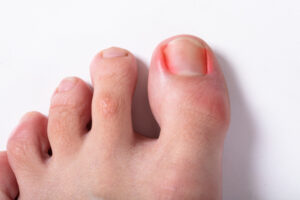How to Prevent or Treat Ingrown Nails
 Do you have a problem with ingrown nails? They can be extremely painful, and an ingrown toenail can even make it difficult to walk. Fortunately, they can be treated successfully. Even better, you can take steps to prevent ingrown nails.
Do you have a problem with ingrown nails? They can be extremely painful, and an ingrown toenail can even make it difficult to walk. Fortunately, they can be treated successfully. Even better, you can take steps to prevent ingrown nails.
- What is an ingrown nail? This common condition occurs when a corner or side of a nail grows into the flesh around the nail. It can happen to fingernails and toenails, but it’s more common with toenails. Ingrown nails cause pain, redness, swelling, and can sometimes cause an infection.
- Why do ingrown nails happen? You can get an ingrown toenail from stubbing your toes or wearing shoes that are too tight. Ingrown nails can also happen when nails are cut too short or incorrectly. Toenails should be cut straight across, and fingernails should be cut in a gentle curve. Don’t tear or bite your nails, and pay attention so that you can catch the signs of ingrown nails early. Wear comfortable shoes and socks and if you have diabetes, have regular foot exams.
- You can treat ingrown nails at home. Soaking your affected hand or foot in warm water for 15-20 minutes, three or four times a day, can reduce swelling and relieve tenderness. You can also try soaking in apple cider vinegar, which may have antiseptic, anti-inflammatory, and pain-relieving abilities. Some sources recommend gently lifting the skin away from the toenail with cotton or waxed dental floss. Over-the-counter pain relievers like acetaminophen, ibuprofen, or naproxen sodium may alleviate pain, and antibiotic cream can help with infection.
- If home remedies don’t work, see your dermatologist. It’s important to get treatment for an ingrown nail, because when they’re left untreated, ingrown nails can cause serious problems, including infection in the bone. Your doctor can treat an ingrown nail in a variety of ways, including lifting the nail to separate it from the overlying skin and help it to grow above the skin edge. Partially or completely removing the nail is also a method of treating ingrown nails. Your doctor might also prescribe topical or oral antibiotics, especially if the finger or toe is infected or at risk of becoming infected.
Whether you need help with your skin, hair, or nails, Swinyer-Woseth Dermatology is committed to providing superior, professional care that’s practical, efficient, and compassionate. With over 30 years of experience providing dermatological services in Salt Lake City, we provide a variety of services, from cosmetic skincare to treatment for skin cancer. Our team of board-certified dermatologists, licensed cosmetic service providers, and friendly staff members is here to provide you the care you need in a comfortable, professional atmosphere. For more information, contact us through our website or call 801.682.4715 today.
